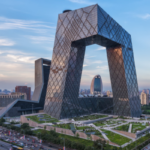

Lelia Lim
Pioneering Sustainable Workplaces: A Path Forward
In the evolving global business landscape, where environmental sustainability and operational excellence increasingly intersect, a select group of companies has emerged as frontrunners, demonstrating the tangible benefits of aligning commercial success with ecological responsibility. At the heart of this transformation is the concept of green funding and economy, a powerful catalyst for change that propels businesses towards greener practices and opens up new avenues for growth and customer engagement.
For instance, Sino Land in Hong Kong is a beacon of environmental stewardship within the real estate sector. In a landmark move, Sino Land secured a staggering HK$3 billion in green financing, underscoring the financial sector’s growing confidence in sustainable projects. This infusion of green capital is earmarked for developing eco-friendly buildings, which promise to minimise environmental footprints and enhance living spaces for communities, setting a new standard in sustainable urban development.
Similarly, retention successes have underscored the strategic advantage of environmental and operational achievements. Companies that have invested in sustainable practices often report higher levels of customer loyalty, as consumers increasingly prefer brands that demonstrate a commitment to the planet. This shift in consumer preferences is reshaping marketing strategies, with sustainability becoming a key driver of brand differentiation and customer retention.
Further epitomising the marriage of operational excellence with environmental responsibility is L’Occitane. The renowned beauty and skincare brand has garnered several operational awards, recognising its efforts in reducing waste, conserving energy, and sourcing ingredients sustainably. These accolades have not only burnished L’Occitane’s corporate image but have also attracted a broader customer base, eager to support a brand that aligns with their values.
These examples serve as a testament to the multifaceted benefits of green funding and sustainable operations. Beyond the positive environmental impact, these initiatives foster innovation, drive customer engagement, and enhance brand reputation, offering a compelling case for companies on the cusp of adopting greener practices.
Leveraging Human Resources for Sustainability
However, how can businesses harness the power of green funding and sustainability to thrive in today’s competitive landscape and contribute meaningfully to the global effort against climate change? One aspect is recognising the function of human resources, which plays a pivotal role in the sustainability agenda. Beyond the traditional roles of hiring, firing, and compliance, HR is a strategic partner in building sustainable processes and a culture that respects and leverages the triple bottom line approach (people, planet, profit).
With this in mind, leaders can drive their organisations towards a sustainable future by prioritising and investing in their most valuable asset – their people. They can initiate sustainable HR practices that foster growth and innovation, leading to financial profit and a competitive advantage in the global marketplace.
Why HR Is Critical to a Sustainable Workplace
Human resources can uniquely influence every aspect of an organisation’s sustainability agenda. With their knowledge of employment law, organisational culture, and talent management, HR professionals are equipped to significantly contribute to building sustainable systems. By implementing policies that promote diversity and inclusion, investing in employee well-being programs, and optimising talent management, HR can create a workplace built for longevity that addresses environmental responsibility.
The Economic Impact on Financial Performance
Historically, sustainable business practices were seen as a cost, a necessary overhead to maintain an ethical standing. However, an increasing body of evidence suggests quite the opposite. Sustainable practices lead to reduced turnover, increased productivity, enhanced brand reputation, and higher financial performance. For HR, sustainability is not just a compliance issue; it’s a means to drive economic growth and resilience.
The Social Imperative
The contemporary workforce values social contributions and expects workplaces to reflect those values. HR is responsible for aligning organisational values with employee expectations, ensuring the workplace is a space where individuals can thrive professionally and personally. By fostering a culture of inclusivity and respect, HR promotes social responsibility within the organisation.
Environmental Responsibility and Stewardship
Companies are increasingly held accountable for their carbon footprint and environmental impact in light of growing environmental challenges. HR’s role in sustainability extends to promoting green practices, from reducing waste in the office to encouraging remote work to lower emissions. By championing environmental stewardship, HR is instrumental in reducing an organisation’s ecological footprint.
Sustainable Development Through HR Practices
Creating a sustainable workplace requires a holistic approach, and here are some actionable steps leaders can take to initiate and maintain sustainable practices within their organisations.
1. Design an Inclusive Work Culture
An inclusive work culture is fundamental to sustainability. HR can lead the charge by implementing diversity initiatives, ensuring equal opportunities for all, and reskilling or upskilling employees from diverse backgrounds. This not only fosters a socially responsible environment but also broadens the perspective of the workforce, leading to better innovation and problem-solving.
2. Develop a Corporate Sustainability Strategy
HR professionals should be at the forefront of developing and implementing corporate sustainability strategies. This includes setting clear, measurable sustainability goals, integrating sustainability into the organisation’s mission and values, and ensuring buy-in from all levels of the organisation.
3. Invest in Employee Well-Being
Sustainable organisations prioritise the health and well-being of their employees. HR should craft comprehensive well-being programs that address health’s physical, mental, and social aspects. Flexible work arrangements, mental health support, and fitness programs are just a few initiatives contributing to a sustainable workplace.
4. Skill Development for the Future
With rapid technological advancements, the skills required in the workplace are continually evolving. HR’s role in sustainable talent management involves identifying the skills of the future, providing opportunities for training and development, and creating career pathways that align with the organisation’s long-term sustainability objectives.
Case Studies in HR-driven Sustainability
HR plays an impactful role in sustainability, and innovative HR practices can translate into a more sustainable, profitable, and socially responsible organisation. For example, Lim-Loges & Masters’ worked with Platinum Guild International, China, to introduce HR-led sustainability initiatives. By championing the GRASP Innovation Methodology Training, PGI was able to unite its workforce around a sustainable, innovative agenda.
The GRASP program engaged 40 innovation champion participants, who underwent a rigorous course focused on real-life work issues. Participants developed a deep understanding of innovative tools and applied them to achieve tangible outcomes aligned with PGI’s sustainability goals.
The results of the program were a testament to HR’s strategic role in innovation and sustainability:
⦁ The GRASP tools resulted in transformative solutions for PGI’s key projects.
⦁ Staff developed advanced problem-solving capabilities, directly contributing to sustainable business practices.
⦁ The organisation enhanced its presentation and communication skills, which are vital for engaging stakeholders in its sustainability efforts.
The Road Ahead for HR and Workplace Sustainability
The example of PGI is just the beginning of HR’s potential to shape a sustainable workplace. As the global business landscape continues to shift towards a more sustainable future, HR leaders have an unprecedented opportunity to drive change. Sustainability is not just about doing the right thing – it’s about creating value for the organisation and society at large. By taking on a more strategic role, HR can help organisations achieve long-term success by transforming their workforce into a sustainable, competitive advantage.
Are you ready to make HR a catalyst for sustainability in your organisation? The time is now, and the path is clear. Start building a sustainable workplace today and secure your organisation’s future for tomorrow.
LLM has recently launched its new #Sustainability@PeopleInBiz – a suite of 9 programmes designed in strategic partnership with the B Purpose Bureau, Eden Strategy Institute (ESI), and Diversity, Inclusion and Education Consultant, Gary Loke, to propel companies towards a sustainable future through their people. Created to help leaders and organisations adapt to a fast-paced global market, each tailored programme emphasises sustainability practices for enduring growth and competitive advantage in a conscious marketplace. To find out more, contact us or visit https://limlogesmasters.com/sustainability-solutions/
Leila Lim
Managing Partner,
Asia Pacific, Lim-Loges & Masters
About Lim-Loges & Masters
Lim-Loges & Masters (LLM) is an award-winning boutique C-suite recruitment & HR consulting agency offering Executive Search, Transition Management and Disruption Management expertise across Asia Pacific. LLM partners with multinational companies seeking to transform their organisations through their people. It supports businesses needing to engage talent in a radical way to meet the future of work. Find out more: https://limlogesmasters.com/







